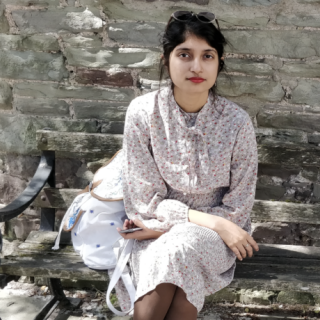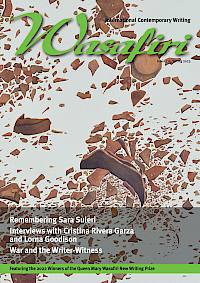Writing with Others: In Conversation with Cristina Rivera Garza and Sarah Booker
We're pleased to share an exclusive extract from our interview with Cristina Rivera Garza and Sarah Booker, published in our latest issue, Wasafiri 113. In this conversation led and introduced by Sohini Basak, Rivera Garza talks about the power of poetry, the shared rootedness of reading, and the politics and ethics of language and translation. Read the full article online, or in Wasafiri 113, which is available to purchase via our shop.
To read Cristina Rivera Garza’s work is to be immersed in a kind of borderlessness. Her writing moves seamlessly between fiction, memoir, literary criticism, poetry, archival work — and it’s impossible not to notice the fluidity between settings, characters, the real, and the imaginary. Working in both Spanish and English, between Mexico and the United States, her deeply interconnected books engage with all kinds of boundaries: of the body and gender, of the ecological and human world, of the limitations of communication and language, of histories both personal and collective. Rivera Garza’s work began to get noticed by the English-speaking audience with the publication of The Iliac Crest (Feminist Press; & Other Stories) in Sarah Booker’s translation. The novel, the second English-language translation to have been published (following No One Will See Me Cry, which was published in 2003 by Curbstone Press and is no longer in circulation), was published in Spanish in 2008. When the English translation came out a decade later, Rivera Garza had already published eighteen books in the Spanish language and been conferred with all the major literary awards in Mexico, including the Sor Juana Inés de la Cruz Prize twice, and more recently, the José Emilio Pacheco Prize. Since The Iliac Crest, four other books have been translated into English and published in the United States by various small presses. This interview with Cristina Rivera Garza and her primary translator Sarah Booker was conducted via email shortly after the publication of New and Selected Stories (Dorothy, a publishing project) in the summer of 2022.
Sohini Basak: I want to start with a couple of questions about your relationship with poetry: you’ve published several volumes in Spanish, the latest in 2011, and I noticed how New and Selected Stories (2022) is delightfully replete with poetic forms and references — there’s a villanelle-shaped short story; Xavier Villaurrutia’s nocturne starts another one; lines from a Michael Palmer poem act as refrain and dialogue; there is a note on appropriating a phrase by Ted Hughes. So, firstly, can you talk about the evolving interest you have had in writing and publishing poetry, and in identifying as a poet? Do you still use the form, even if privately, to unravel thoughts or generate ideas?
Cristina Rivera Garza: My relationship with poetry is unending and central to my work. Rather than a genre, as such, I conceive of poetry as a field, which, material and spiritual at once, allows utmost proximity to language. I’d like to quote Lyn Hejinian on this one (albeit from the top of my head): poetry is the language with which we investigate language, situating poetry at the crossroads of knowledge and imagination, of aesthetics and ethics. Poetry, thus understood, grows at the base of every single writing project I take care of, which may end up taking a range of forms, usually a sort of cross-genre matrix involving a wide array of materials put together according to specific patterns of juxtaposition. I read more poetry books than novels, and as much poetry as theory. I have a special weakness for poetry in translation. In the book that I am reading right now (Material Poetics in Hemispheric America. Words and Objects 1950–2010 by Rebecca Kosick), a series of materialist poetries, or poetics, are discussed, emphasising practices across the Americas that work closely with the interlocking nature between the verbal and the material in poetry. I feel that.
As someone working between, and in two, languages, do you see poetry still holding a communal role in this world?
The power of poetry to interrogate the world in which we live, how we perceive it or how we move through it, is concomitant to the form. Poetry dares. Poetry brings together. As a writer I’ve always been interested in what language does (or fails to do) in our midst, but leading a bilingual life in the United States, especially a bilingual life in between two languages linked by colonial ties, has made me relentlessly aware of language’s ongoing operations both to imperil us and to enable us to break free. We are never as powerless, or as lonely, as when we are rendered languageless; when we find ourselves at a loss for words, mouth gaping, disoriented, broken. This is often referred to as trauma, but traumas are seldom random happenings — they are experiences engineered by ruthless states which, in tandem with extractive economies, produce dominant narratives that take language from us. Writing is political less for the topics it explores, or the ideological leanings of specific authors, but for this relentless proximity with, or dismantling of, the language we depend on to breathe.
To me, this human dependence on language also seems central to your fiction. For example, your characters are often caught in the drama of remembering and/or recognising languages; moments, even plot lines, pivot on the legibility or foreignness of words and scripts. Most notably, in The Iliac Crest and The Taiga Syndrome, characters often struggle to read or write. In your short fiction too, writing, memory, and forgetting are intertwined in intriguing syllogisms (such as a narrator revelling in the ‘possibility of forgetting how to write’ in ‘Carpathian Mountain Woman’).
They seem to be caught between a need to be both visible and heard, and a desire to be invisible and unreadable, and therefore be protected in a way. Could you tell us if you’ve always written fiction from this dichotomy that embodies human language: language can be used to liberate and challenge social orders, but it can also be abused to obfuscate, alienate, and exclude peoples?
This part of your question (‘our need to be both visible and heard, and our desire to be invisible and unreadable, and therefore be protected in a way, to be a question central to your art’) takes me directly back to Edouard Glissant and his exploration of opacity as ‘an alterity that is unquantifiable, a diversity that exceeds categories of identifiable difference’. Non-normative bodies are all too often subjected to colonial schemes of visibility that not only limit the complexity of their material experience in, and with, the world but constitute explicit forms of violence in and of themselves. Opacity works against these strategies of forced transparency — and many of them lie, dangerously so, perversely so, at the root of identity discourses that I’ve grown suspicious of. Eduardo Gruner, an Argentinian scholar, once wrote that poetry – although I’d include all forms of writing in this definition – works with enigmas, less to unpack them and more to preserve them as such, as enigmas. Reading does not produce clarity, intellectual or otherwise, but a sharing rooted well within our bodies (our systems of perception), and in connection with other bodies. Reading, in this sense, becomes a complicity ...
Wasafiri 113 remembers author and professor Sara Suleri with touching tributes from Kamila Shamsie, Amina Yaqin, and others. Also featured in the issue are the winners of the 2022 Queen Mary Wasafiri New Writing Prize and the 2022 Essay Prize, interviews with Lorna Goodison, Cristina Rivera Garza, and Sarah Booker, plus our usual range of fiction, life writing, poetry, and reviews.


